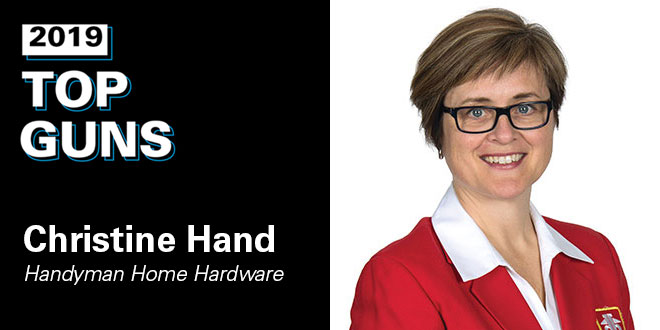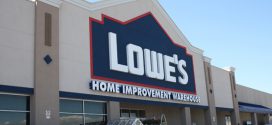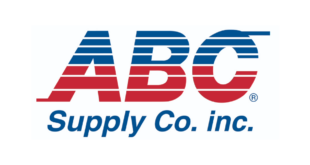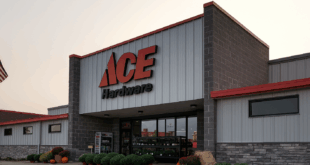Christine Hand, Owner, Handyman Home Hardware, 2 Stores in Newfoundland, Canada
Christine Hand purchased Handyman Home Hardware in Newfoundland, Canada, nearly 30 years ago from her father after initially working in software development. She has served on the Home Hardware Ltd. board of directors since 2003 and is currently in her seventh term as board chair. She recently opened her second store location in Newfoundland.
Hardware Retailing (HR): What’s the history of Handyman Home Hardware? How did you get involved?
Christine Hand (CH): My father is a real estate developer. Back in 1988, he was expanding a newly built strip mall and was looking for an anchor tenant. He approached the Home Hardware retailer across the street to entice him to move. The retailer was not interested, but instead he offered to sell my dad the business. My dad bought the store with no retail experience or real desire to be in retail.
At the time, this was not even on my radar as a career choice. I was on maternity leave from a business analyst job at a computer services company. We had just written and installed an inventory control system for an auto parts distributor, and I had done the analysis work and training, so I was familiar with the inventory control lingo. I volunteered to go into my dad’s new store for a couple of months to get things set up for him on their existing POS system. Long story short, I quit my job before my maternity leave was over, and I have never looked back.
Four years later, on Dec. 1, 1992, my husband and I bought the store from my father. What intrigued me in those first couple of months was the challenge of learning something new and the interaction and problem-solving aspect every day with each new customer. I also remember enjoying the flexibility of working on my own schedule, which was usually much longer than the job I left and sometimes at weird hours late into the night. I was also much closer to home—literally across the street—and it felt great not to have to commute and to be able to run home whenever I needed to.
HR: What unique challenges do independent retailers face in today’s market?
CH: Independent retailers have always had to fight the big-box volume, selection and price image. The difference today is that the competition no longer has to be in your backyard—it can be anywhere in the world.
As independents, we have to be able to meet customer expectations about selection, delivery, pricing and return policies. Our competition is no longer the traditional hardware and LBM retailer because now everyone wants a piece of our pie. For example, many grocery stores have been entering the home improvement space in recent years, not to mention online retailers.
Another challenge we face is competition for staff. We are expected to give expert service, and that knowledge costs money. We have to offer competitive salaries and costly benefit packages. While I have some amazing young people working with me, I don’t expect them to stay with me for 20 years as I would have in the past. Today’s labor force is more transient than ever.
HR: What are some key opportunities independent retailers have in the short term?
CH: Our customers are time starved. We are typically conveniently located with ample parking and accessible staff, so we can help our customers save time. That’s important to them.
As independent retailers, we can take advantage of niche markets in our communities and fill a void that chain stores typically aren’t flexible enough to fill. We can also support local vendors and build sales in that sector.
Through our wholesale affiliations, we have access to tens of thousands of items that we do not need to stock. We need to promote that fact more in store and become top of mind when a customer is looking for something. We have been offering a ship-to-store option for decades, we’ve just never promoted it as such. It’s a huge opportunity. We have always said, “If it’s not here, we can get it for you in less than week.” We’ve always been in the special-order business, we just haven’t been calling it a specific name. Now it’s called e-commerce ship-to-home or buy online, pickup in store (BOPIS), and it’s a service people expect.
Because I’m located on an island, one- or two-day free shipping is not generally expected. If a customer needs something overnight, they are willing to pay for it. We recognize as a company that we’ve got to figure this kind of service out and do something about it. It’s a huge opportunity.
For example, there are four affiliated stores in our metro area. If we could check the inventory among ourselves and fill a special order locally, we could have it ready the same day or the next day without incurring the shipping costs.
The truth is, no matter what small town you live in, people are expecting things faster.
HR: What advice would you give to someone getting started in the independent industry?
CH: This industry has given me and my family a way of life I could not have imagined. In fact, I would classify being an independent retailer as a lifestyle, as it does become a family affair.
The industry is about building relationships with your customers, your staff and your community. Many of the things that make a successful retailer are common sense—have a clean, bright, organized store with friendly, knowledgeable staff. It’s simple, but it takes hard work and the right attitude. Complacency is something you have to be keenly aware of.
To combat complacency, you have to keep it top of mind. Take time to walk into the store as though it’s your first time. You have to be vigilant about looking at your operation with fresh eyes. I also get that experience and awareness by visiting other stores, going to markets and visiting my competitors to see what they’re doing. I take my observations home and I see how we could do better. It’s important to always be comparing your operation to others to get new ideas and know what else is happening out there.
HR: What do you think the industry will look like in five to 10 years?
CH: I wish I had a crystal ball. I’m sure there will always be a need for our expertise in helping people solve their problems. I believe small to medium neighborhood stores, as opposed to huge big boxes, will be a benefit. As the population moves from rural to urban areas, we will need to be there, too.
I think we will streamline our in-store assortment to core items and rely more heavily on technology and an efficient supply chain to be able to access noncore items for customers in a day or two and deliver them to the customer’s door.
“Since day one, I have taken advantage of opportunities to learn and network. Even after being in the business for 30 years, I can still take something away from a store visit or from chatting with another retailer.”
HR: Where do you see your business in the next five to 10 years?
CH: Something I like to say is, “Whatever’s new, that’s what we do.” There is a need to continuously reinvest in your business to remain relevant. In the next five to 10 years, I expect to remerchandise the store and to tweak it according to our customers’ demands.
We will also keep up with technology and modernize as possible, like we have done over the past 30 years.
Most recently, we implemented the new POS system that our wholesaler offers. I didn’t need to change, but it’s a new system that’s going to allow me better control of my inventory. Additionally, as Home Hardware pilots projects in the future, they will likely use the most recent version of their software to do that. That’s an advantage for me as I’ll have access to those programs because I have the latest technology if something comes available.
About two years ago, we remerchandised the store for the umpteenth time. We turned aisles and utilized our wholesaler’s Power Aisle Merchandising Program. I think we were the first store in our area to put a corral at the checkout as opposed to the traditional layout. We saw that being the trend at other retail stores and saw it as an opportunity to grow impulse sales. We just keep changing.
HR: What’s the value of networking with other independent retailers?
CH: Since day one, I have taken advantage of opportunities to learn and network. Even after being in the business for 30 years, I can still take something away from a store visit or from chatting with another retailer on the market floor.
We also continue to take advantage of webinars and e-learning opportunities knowing that expert staff is one of our differentiators.
You have to be continuously changing and evolving your business and be personally open to learning or business will pass you by.
HR: What’s the biggest challenge you have with pricing and how do you deal with it?
CH: We have always had a price perception issue. I would like to have a dime for every time a customer says to me, “I don’t mind paying a bit more because of the great service I get here.” Somehow consumers believe we are more expensive because we are independently owned. Of course, now things are more complicated because consumers have global pricing available in the palm of their hand.
Our wholesaler has been working to change that price perception through an aggressive approach in our flyers and using a price match guarantee. We also set up a power aisle in our store to give the low price impression that is associated with large piles of merchandise. It’s also important to have the right quantity of price buster items.
We have seen improvements with these changes. I don’t think we hear from customers as much as we used to that they don’t mind paying more.
What customers don’t understand is that if they buy a basket of goods here, they’re going to be very close on overall price with the same basket of goods at a competitor.
Of course, private-label brands are a great way to build margin and provide good value to customers while making it difficult to price compare.

HR: What are three things you tell your employees about customer service?
CH: Acknowledge every customer who comes into their line of sight. I learned a concept from another retailer called the 10-4 rule: If you are within 10 feet of a customer you acknowledge them, and if you are within 4 feet, you speak to them.
We talk about interacting with a customer as you would a guest in your home. We don’t ask them, “Can I help you?” but we ask open-ended questions, like what they’re working on, what brings them in today, what can we help them find.
We also tell our staff to pretend they are on the other side of the counter. What do you need to say to wow the customer, especially when it comes to returns.
For returns, it’s all about attitude. When someone walks up to the counter with something to return, they’re already anticipating a “no.” They may already be agitated because the product they purchased didn’t work or wasn’t what they needed.
For us, it’s about being empathetic and not just quoting the return policy chapter and verse. We explain that we want to help them figure out how to help, but we need to take certain steps first. For example, we can’t accept a lawn mower with gasoline in it, so we suggest they take it to a mechanic to be fixed instead.
We also look at returns as an opportunity to sell something else. We try to focus on finding out what they’re working on in order to suggest something that would work better.
 Hardware Retailing The Industry's Source for Insights and Information
Hardware Retailing The Industry's Source for Insights and Information






